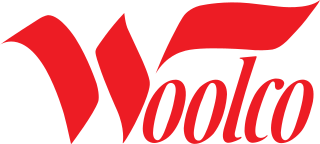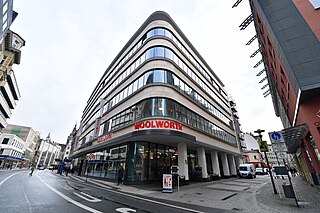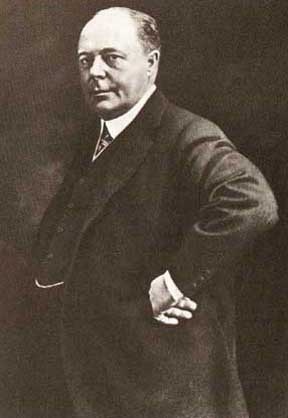
Frank Winfield Woolworth was an American entrepreneur, the founder of F. W. Woolworth Company, and the operator of variety stores known as "Five-and-Dimes" which featured a selection of low-priced merchandise. He pioneered the now-common practices of buying merchandise directly from manufacturers and fixing the selling prices on items, rather than haggling. He was also the first to use self-service display cases, so that customers could examine what they wanted to buy without the help of a sales clerk.

The F. W. Woolworth Company was a retail company and one of the pioneers of the five-and-dime store. It was among the most successful American and international five-and-dime businesses, setting trends and creating the modern retail model that stores follow worldwide today.

Nordstrom, Inc. is an American luxury department store chain headquartered in Seattle, Washington, and founded by John W. Nordstrom and Carl F. Wallin in 1901. The original Wallin & Nordstrom store operated exclusively as a shoe store, and a second Nordstrom's shoe store opened in 1923. The growing Nordstrom Best chain began selling clothing in 1963, and became the Nordstrom full-line retailer that presently exists by 1971. The company founded its off-price Nordstrom Rack division in 1973, and grew both full-line and off-price divisions throughout the United States in the following years. The full-line division competes with department stores including Bloomingdale's, Macy's, Neiman Marcus, and Saks Fifth Avenue, while the off-price division competes with retailers including the TJX Companies and Ross Stores. Previous expansions beyond the contiguous United States include Puerto Rico (2015–2020) and Canada (2014–2023).
Woolworth, Woolworth's, or Woolworths may refer to:

A variety store is a retail store that sells general merchandise, such as apparel, auto parts, dry goods, toys, hardware, furniture, and a selection of groceries. It usually sells them at discounted prices, sometimes at one or several fixed price points, such as one dollar, or historically, five and ten cents. Variety stores, as a category, are different from general merchandise superstores, hypermarkets, warehouse clubs, grocery stores, or department stores.

Woolco was an American-based discount retail chain. It was founded in 1962 in Columbus, Ohio, by the F. W. Woolworth Company. It was a full-line discount department store unlike the five-and-dime Woolworth stores which operated at the time. At its peak, Woolco had hundreds of stores in the US, as well as in Canada and the United Kingdom. While the American stores were closed in 1983, the chain remained active in Canada until it was sold in 1994 to rival Walmart, which was looking to enter the Canadian market. All of the former UK Woolco stores were sold by Kingfisher, which had bought the UK Woolworth business, to Gateway which subsequently sold them to Asda.

Woolworths Group Limited is an Australian multinational retail and finance company, primarily known for the operation of its retail chain Woolworths Supermarkets across Australia, Woolworths in New Zealand and its discount department store Big W. Headquartered in Bella Vista, Sydney, it is the largest company in Australia by revenue and number of employees, and the second-largest in New Zealand.
A discount store or discounter offers a retail format in which products are sold at prices that are in principle lower than an actual or supposed "full retail price". Discounters rely on bulk purchasing and efficient distribution to keep down costs.

Woolworths was a British high-street retail chain. At its height, it operated as Woolworths Group PLC, which included other companies such as the entertainment distributor Entertainment UK, and book and resource distributor Bertram Books.

Giant Tiger Stores Limited is a Canadian discount store chain which operates over 260 stores across Canada. The company's stores operate under the Giant Tiger banner in Alberta, Manitoba, New Brunswick, Nova Scotia, Ontario, Prince Edward Island and Saskatchewan; under the GTExpress and Scott's Discount banners in Ontario and under the Tigre Géant banner in Quebec.

Sayvette was a discount department store in Canada from 1961 to 1977. The chain was announced in February 1961, and launched its first store at Thorncliffe Market Place in a Toronto suburb that September. Over 70,000 customers passed through the first Sayvette on September 7, 1961. Sayvette City, at the southwest corner of Yonge Street and Steeles Avenue, opened in November, claiming to have the largest retail space in Metropolitan Toronto. Sayvette carried St. Michael-branded goods from British department store Marks and Spencer.

Foot Locker, Inc. is an American multinational sportswear and footwear retailer headquartered in Midtown Manhattan, New York City, and operating in over 40 countries.

Big W is an Australian chain of discount department stores, which was founded in regional New South Wales in 1964. The company is a division of the Woolworths Group and as of 2024 operated 178 stores, with around 18,000 employees across mainland Australia and Tasmania. Big W stocks clothing, health and beauty, garden, manchester, kitchenware, toys, pet items, office items, books, televisions, DVDs, CDs, gaming consoles, video games, some furniture items, snack food and small electrical household appliances both on their website and in retail stores.

Woolworths Supermarkets is an Australian chain of supermarkets and grocery stores owned by Woolworths Group. Founded in 1924, Woolworths today is Australia's biggest supermarket chain with a market share of 33% as of 2019.

Deutsche Woolworth GmbH & Company OHG is a chain of department stores in Germany and was a former subsidiary of the American F. W. Woolworth Company. As of 2022 the chain has more than 570 stores in Germany, 18 in Poland and 2 in Austria, they are aiming to have over 1,000 in the medium term and over 5,000 across Europe in the long term.

Seymour Horace Knox I, was a businessman from Buffalo, New York, who made his fortune in five-and-dime stores. He merged his more than 100 stores with those of his first cousins, Frank Winfield Woolworth and Charles Sumner Woolworth, to form the F. W. Woolworth Company. He went on to hold prominent positions in the merged company as well as Marine Trust Co. He was the father of Seymour H. Knox II and grandfather of Seymour H. Knox III and Northrup Knox, the co-founders of the Buffalo Sabres in the National Hockey League.
Woolworths (Ireland) was a retail chain that operated on the island of Ireland. Woolworths had operated stores in the Republic of Ireland until 1984, while stores in Northern Ireland became fully part of F. W. Woolworth plc and these stores lasted until 2009 when the Woolworths Group fell into administration. The defunct brand then being owned by The Very Group.

Charles Sumner Woolworth, was an American entrepreneur who went by the nickname of "Sum", opened and managed the world's first five-and-dime store in Scranton, Pennsylvania, and was founder of the "C. S. Woolworth & Co" chain of 5¢ & 10¢ stores. Sum's brother, Frank Winfield Woolworth, was first to venture into the retail business with his own store, and soon after, he asked Sum to join him. Frank founded "F. W. Woolworth & Co", which later merged with other Woolworth affiliate stores to be the F. W. Woolworth Company. After the death of his brother, Sum became the longest serving Chairman of the F. W. Woolworth Company. During the early years, Sum also partnered with a long-time friend, Fred Kirby, to open a "Woolworth and Kirby" store in Wilkes-Barre, Pennsylvania. When Fred bought out Sum's share, that store grew to become a "friendly rival" affiliate store, in close alliance with the two Woolworth brothers.

Big W was a British retail chain owned by the Kingfisher Group in the United Kingdom, which operated between 1998 and 2004. Big W stores were large format out-of-town megastores that featured products from all of Kingfisher's main retail chains at the time, consisting of Comet, B&Q, Superdrug and Woolworths.

Anderson–Little was an American clothing manufacturer and retailer of the 20th century, particularly of men's suits. It operated in the eastern United States, and in New England in particular.




















